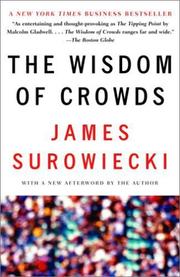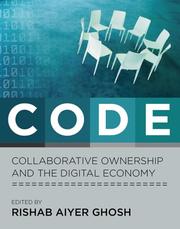| Listing 1 - 3 of 3 |
Sort by
|
Book
ISBN: 9782130543688 2130543685 Year: 2005 Publisher: Paris : Presses universitaires de France,
Abstract | Keywords | Export | Availability | Bookmark
 Loading...
Loading...Choose an application
- Reference Manager
- EndNote
- RefWorks (Direct export to RefWorks)
Law --- Sociological jurisprudence. --- Norm (Philosophy) --- Common good. --- Droit --- Sociologie juridique --- Norme (Philosophie) --- Bien commun --- Philosophy --- Philosophie --- Règle de droit --- Règle de droit. --- Philosophie. --- Law - Philosophy

ISBN: 9780385721707 0385721706 0385721706 0385721706 9780385721707 Year: 2005 Publisher: New York : Anchor Books,
Abstract | Keywords | Export | Availability | Bookmark
 Loading...
Loading...Choose an application
- Reference Manager
- EndNote
- RefWorks (Direct export to RefWorks)
In this book, New Yorker columnist Surowiecki explores a deceptively simple idea that has profound implications: large groups of people are smarter than an elite few, no matter how brilliant--better at solving problems, fostering innovation, coming to wise decisions, even predicting the future. With seemingly boundless erudition and in clear, entertaining prose, Surowiecki ranges across fields as diverse as popular culture, psychology, ant biology, economic behaviorism, artificial intelligence, military history and political theory to show just how this principle offers important lessons for how e live our lives, select our leaders, run our companies, and think about our world.--From publisher description.
Consensus (Social sciences) --- Common good. --- Group decision making. --- Consensus (Sciences sociales) --- Bien commun --- Décision de groupe --- crowdsourcing --- Décision de groupe

ISBN: 0262572362 0262072602 9786612097805 1423746473 026225624X 1282097806 9780262256247 9781423746478 9780262072601 9780262572361 Year: 2005 Publisher: Cambridge, Massachusetts : [Piscataqay, New Jersey] : MIT Press, IEEE Xplore,
Abstract | Keywords | Export | Availability | Bookmark
 Loading...
Loading...Choose an application
- Reference Manager
- EndNote
- RefWorks (Direct export to RefWorks)
Open source software is considered by many to be a novelty and the open source movement a revolution. Yet the collaborative creation of knowledge has gone on for as long as humans have been able to communicate. CODE looks at the collaborative model of creativity -- with examples ranging from collective ownership in indigenous societies to free software, academic science, and the human genome project -- and finds it an alternative to proprietary frameworks for creativity based on strong intellectual property rights.Intellectual property rights, argues Rishab Ghosh in his introduction, were ostensibly developed to increase creativity; but today, policy decisions that treat knowledge and art as if they were physical forms of property actually threaten to decrease creativity, limit public access to creativity, and discourage collaborative creativity. "Newton should have had to pay a license fee before being allowed even to see how tall the 'shoulders of giants' were, let alone to stand upon them," he writes.The contributors to CODE, from such diverse fields as economics, anthropology, law, and software development, examine collaborative creativity from a variety of perspectives, looking at new and old forms of creative collaboration and the mechanisms emerging to study them. Discussing the philosophically resonant issues of ownership, property, and the commons, they ask if the increasing application of the language of property rights to knowledge and creativity constitutes a second enclosure movement -- or if the worldwide acclaim for free software signifies a renaissance of the commons. Two concluding chapters offer concrete possibilities for both alternatives, with one proposing the establishment of "positive intellectual rights" to information and another issuing a warning against the threats to networked knowledge posed by globalization.
Alliances stratégiques (Affaires) --- Bien commun --- Strategic alliances (Business). --- Electronic commerce --- Strategic alliances (Business) --- Intellectual property --- Group decision making --- Common good --- International cooperation --- Economic aspects --- E-books --- Group decision making. --- Common good. --- Good, Common --- Public good --- Political science --- Consensus (Social sciences) --- Justice --- Public interest --- Collective decision making --- Decision-making, Group --- Decision making --- Alliances in business --- Business alliances, Strategic --- Corporate alliances --- Strategic business alliances --- Strategic corporate alliances --- Strategic partnerships (Business) --- Partnership --- Business networks --- Cybercommerce --- E-business --- E-commerce --- E-tailing --- eBusiness --- eCommerce --- Electronic business --- Internet commerce --- Internet retailing --- Online commerce --- Web retailing --- Commerce --- Information superhighway --- International cooperation. --- Economic aspects. --- Commerce électronique --- Alliances stratégiques (Affaires) --- Propriété intellectuelle --- Décision de groupe --- Coopération internationale --- Aspect économique --- Group decision-making --- Electronic commerce - International cooperation --- Intellectual property - Economic aspects
| Listing 1 - 3 of 3 |
Sort by
|

 Search
Search Feedback
Feedback About
About Help
Help News
News